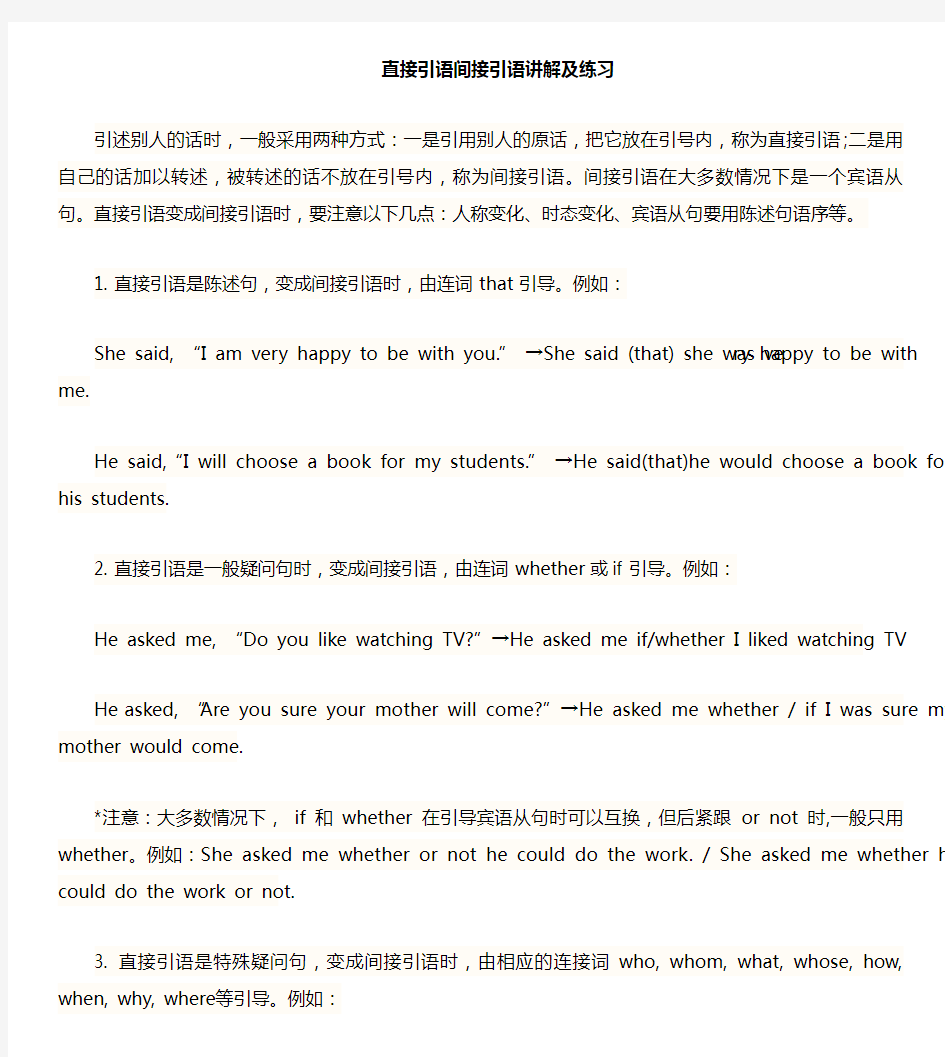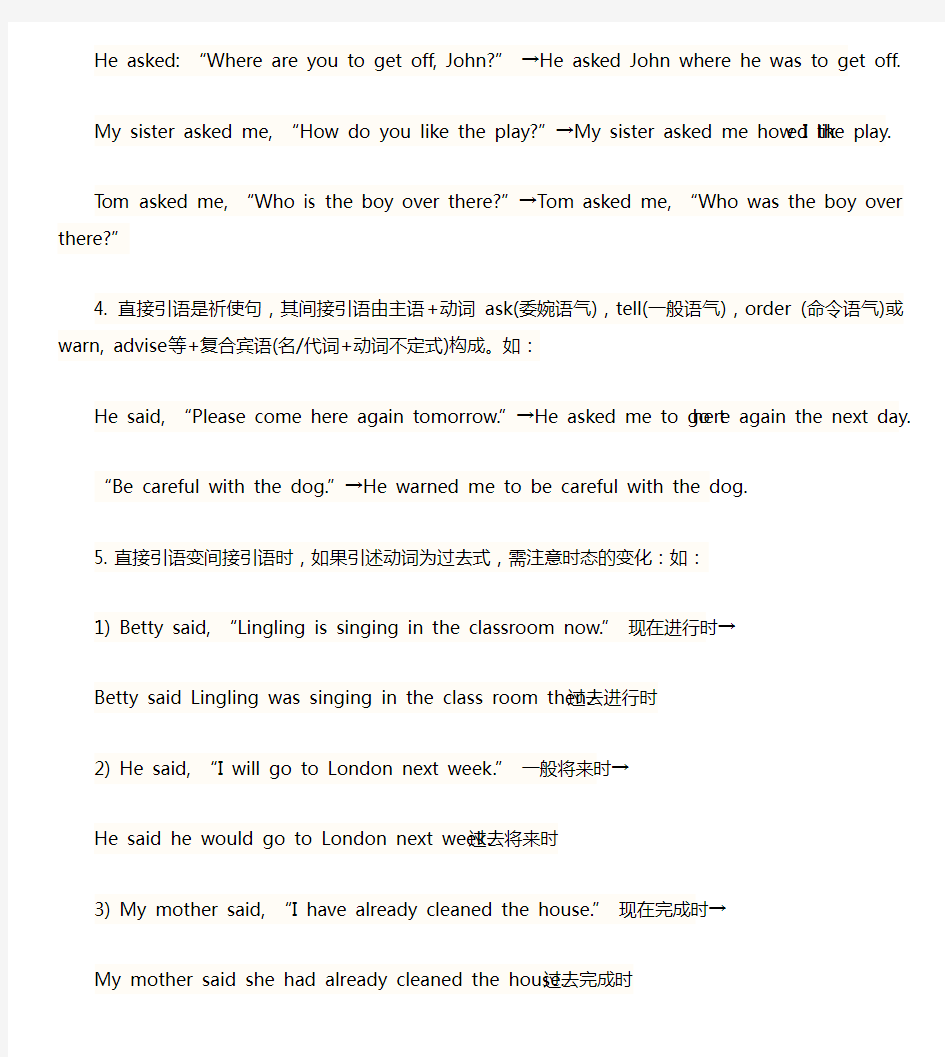直接英语间接引语


直接引语间接引语讲解及练习
引述别人的话时,一般采用两种方式:一是引用别人的原话,把它放在引号内,称为直接引语;二是用自己的话加以转述,被转述的话不放在引号内,称为间接引语。间接引语在大多数情况下是一个宾语从句。直接引语变成间接引语时,要注意以下几点:人称变化、时态变化、宾语从句要用陈述句语序等。
1. 直接引语是陈述句,变成间接引语时,由连词that 引导。例如:
She said, “I am very happy to be with you.” →She said (that) she was very happy to be with me.
He said,“I will choose a book for my students.” →He said(that)he would choose a book for his students.
2. 直接引语是一般疑问句时,变成间接引语,由连词whether或if 引导。例如:
He asked me, “Do you like watching TV?”→He asked me if/whether I liked watching TV.
He asked, “Are you sure your mother will come?”→He asked me whether / if I was sure my mother would come.
*注意:大多数情况下, if和whether 在引导宾语从句时可以互换,但后紧跟or not时,一般只用whether。例如:She asked me whether or not he could do the work. / She asked me whether he could do the work or not.
3. 直接引语是特殊疑问句,变成间接引语时,由相应的连接词who, whom, what, whose, how, when, why, where 等引导。例如:
He asked: “Where are you to get off, John?” →He asked John where he was to get off.
My sister asked me, “How do you like the play?”→My sister asked me how I liked the play.
Tom asked me, “Who is the boy over there?”→Tom asked me, “Who was the boy over there?”
4. 直接引语是祈使句,其间接引语由主语+动词ask(委婉语气),tell(一般语气),order (命令语气)或warn, advise等+复合宾语(名/代词+动词不定式)构成。如:
He said, “Please come here again tomorrow.”→He asked me to go there again the next day.
“Be careful with the dog.”→He warned me to be careful with the dog.
5. 直接引语变间接引语时,如果引述动词为过去式,需注意时态的变化:如:
1) Betty said, “Lingling is singing in the classroom now.” 现在进行时→
Betty said Lingling was singing in the class room then.-过去进行时
2) He said, “I will go to London next week.” 一般将来时→
He said he would go to London next week. 过去将来时
3) My mother said, “I have already cleaned the house.” 现在完成时→
My mother said she had already cleaned the house. 过去完成时
*注意:
1. 直接引语是客观事实、普遍真理等,主句尽管是过去时态,变成间接引语时,时态仍然用一般现在时态。
例如:They told their son,“The earth goes round the sun.”→They told their son that the earth goes round the sun.
2. 直接引语变间接引语时,指示代词、时间状语、地点状语、动词等要作相应的变化。
如:this→that, these→those, now→then, today→that day, yesterday→the day before, last year→the year before, ago→before, here→there ,come→go,tomorrow→the next day,next month→the month after,last year→the year before,a week ago→a week before,bring→take,now→then,the day after tomorrow→in tow day's time,the day before yesterday→tow days before earlier
例如:He said, “I haven’t seen them today.” →He said that he hadn’t seen them that day.
但是,如果转述时对话人双方就在原来的地方,或在说话的当天,就不必改变相应的时间状语、地点状语等。总之,对这些变化不能机械理解,应根据实际情况来决定所作的变化。
3.情态动词的变化
情态动词在间接引语中都可以改为过去式,must表示必、推测、禁止等意思时,可不变;表示必须时可不变,也可用had to 或would have to。
如:The senior said, All men must die.
→ The senior said that all men must die. 那老者说人总是要死的。
She said, I must go to see the doctor tomorrow afternoon.
→ She said she would have to go to see the doctor the next afterno on. 她说第二天下午她一定得去看医生。 He said to me, We used to go there every year.
→ He told me that they used to come here every year. 他对我说他们过去每年都来这里。(used to在间接引语中不变)
4.人称代词的变化
①当主句的主语是第一人称时,引语中的人称代词不变。
如:I said, You did quite well in the exam yesterday.
→ I said that you had done quite well in the exam the day before.我说你那天考得不错。
②直接引语中主语是第一人称时,在改为间接引语时,其人称与主句中的主语的人称一致。
如:He said to Tom, I'll do my best to catch up with others.
→ He told Tom that he would do his best to catch up with others. 他告诉汤姆他将尽他所能赶上其他人。③直接引语中主语是第二人称时,在改为间接引语时,其人称和主句的宾语相一致。
如:He said to her, Where did you put the glasses
→ He asked her where she had put the glasses. 他问她,她把杯子放哪儿了。
④直接引语中主语是第三人称时,在改为间接引语时不发生变化。
如:He said to Tom, She can help them.
→ He told Tom that she could help them. 他告诉汤姆她能够帮助他们。
5.物主代词的变化
如:You should not overlook your fault, Mum said to me.
→ Mum told me that I should not overlook my fault. 妈妈对我说我不应该忽略我的缺点。
The two boys said, We have lost ur dog.
→ The two boys said they had lost their do g. 这两个男孩说他们的狗丢了。
练习
一.按照要求改句子:
A.把下列的直接引语句子改为间接引语的句子:
1.The students said: “We can look after ourselves.”
2.Dennis said: “I have to talk about it on the phone.”
3.The headmaster said: “There will be less pollution in our school next year.”
4. Lana said: “There is no air Or water on the moon.”
5.Alexis said: “I work as a part-time assistant in a bookshop.”6.Peter said to me: “I don’t want to surprise you.”
7.Allan told us: “My dream will come true.”
8.Davy And John said: “We will fall in love with th e city of ShiYan when we live here.”
9.Marcia said to me: “I can bring some snacks And drinks to your house.”
10.Eve told us: “I’m learning how to improve myself.”
11.Nicole said: “It is impossible for me to do such simple jobs.”12.Nicole said : “I may get a get a tutor to my home tomorrow.”13.Erin said: “We can have a surprise party for Lana next Wednesday.”
14.Lana said to me: “My haircut is the same as yours.”
15.Marcia told: “Everyone comes here by bike except me.”
16.Emilio told us: “I can speak three languages.”
17.The woman doctor said: “Don’t be mad at yourself.”
18.Kim said: “My mother may come here And pay for summer camp.”19.Joe told us: “I will fail my test if I’m not hard-working enough.”
20.Xiao Li said to me: “It will be much better if I do my own work.”21.Xiao Li told me: “I don’t want to be your best friend anymore.”22.I said to Xiao Li: “I’m sure you will get over it.”
23.Nana said : “I can’t wait for my friend anymore.”
24.Xiao Li said to me: “I forgot to do mine so I w ant to copy yours.”
25.I told Xiao li: “It will start a bad habit if you copy my homework.”
26. Anna And Eve said: “We are going to buy some gifts for our family”
B.把下列间接引语的句子转换为直接引语:
1.She cried whether I had made a big mistake or not.
2.I asked her if she had visited the museum tow days before.
3.My teacher asked me how long I had spent in practicing those day.
4.Paul said that he hadn't heard a complaint yet.
5.John said that he had been late again.
6.Mary said that she would finish the work that afternoon.
7.She said that she liked maths very much.
8.The teacher told us to pay attention to our spelling.
9. He said what a clever boy he was.
10.She asked me to pass my dictionary to her.
11.Granny said the chemical factory produced terrible gas.
12.The teacher said China was trying to solve noise pollution problems.
13.Kangkang asked granny How long she has been like that.
14.Michael asked Jane if she still wants to have a picnic there.
C.直接引语是祈使句
1.The woman doctor said to Anna: “Eat less meat And tak e more exercise.”
2.Emilio said to me: “Don’t play your CDs too loud.”
3.Dennis said to Eve: “Don’t ask your parents for money.”
4.Alice said to Allan: “Don’t argue with your parents.”
5.The teacher said to me: “Try not to be late for school.”
6. The p olice officer said to the old man: “Don’t turn right until you reach the end of the street.”
7.Mr. Li said to me: “Tell me your opinions about different animals.”
8.Our English teacher said to us: “Do a survey of what movies the students like watching.”
9.My father said to me: “Give a cup of honey to me.”
10.Lucy said to me: “Bring your friend to my party.”
二.填空:
1.“I never eat meat.” he said. He said that ______ never ______ meat.
2. “I have found my wallet.” he said to me. He ______ me that he ______ ______ ______ wallet.
3. The teacher said, “The sun rises in the east and goes down in the west.”The teacher said that the sun ______ in the east and ______ down in the west.
4. “You must come here before five.” he said.He said that I ______ to go ______ before five.
5. He said, “You can sit here, Jim.”He ______ Jim that he ______ sit there
6. “Do you know where she lives?” he asked.He asked ______ ______ knew where she ______.
7. “Stop making so much noise, children.” he said. He ______the children ______ ______making so much noise.
8. “Don’t tell him the news.” she said.She told me _______ ______ ______ him the news.
9. “Are you interested in this?” he said.He ______ ______ I was interested in ______.
文档已经阅读完毕,请返回上一页!
